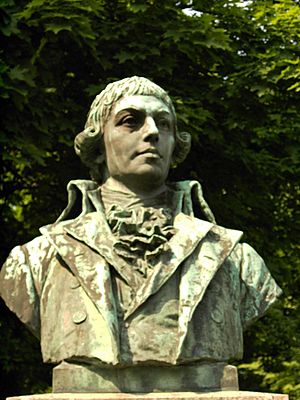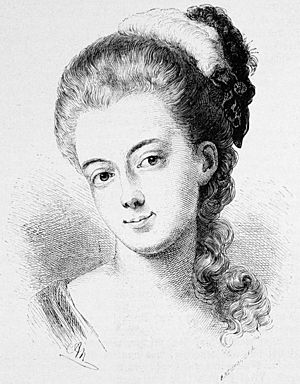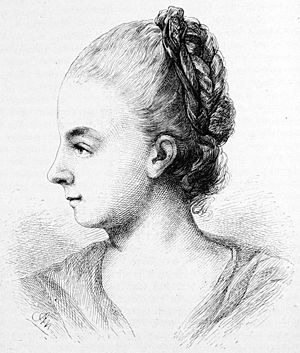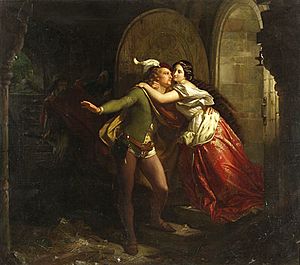Gottfried August Bürger facts for kids
Quick facts for kids
Gottfried August Bürger
|
|
|---|---|
 |
|
| Born |
Gottfried August Bürger
31 December 1747 Molmerswende
|
| Died | 8 June 1794 (aged 46) |
Gottfried August Bürger (born December 31, 1747 – died June 8, 1794) was an important German poet. He was especially famous for his ballads, which are like story-poems. His most well-known ballad, Lenore, became popular not just in Germany but also in other countries. It was adapted into English and Russian, and translated into French.
Contents
Early Life and Education
Gottfried August Bürger was born in Molmerswende, a small town in Germany. His father was a Lutheran pastor. From a young age, Bürger loved quiet places and enjoyed writing poems. He often looked at hymnals for inspiration.
When he was twelve, his grandfather, Bauer, helped him. Bürger went to school in Halle. He found learning Latin quite difficult. In 1764, he started studying theology at the University of Halle. However, he soon changed his mind and decided to study jurisprudence, which is the study of law.
At the university, he met Christian Adolph Klotz. Klotz encouraged Bürger to explore literature. In 1767, Bürger's grandfather asked him to come home because of his behavior. But after Bürger promised to improve, he was allowed to join the University of Göttingen in 1768 to study law.
Becoming a Poet
Even though he faced challenges, Bürger made good progress in his law studies. He also became friends with other young people who loved literature. He read many classic books and works from French, Italian, Spanish, and English authors. He especially liked Shakespeare and old English and Scottish ballads. A book called Reliques of Ancient English Poetry by Thomas Percy was always with him.
Bürger's first poems were printed in the Göttinger Musenalmanach. This was a literary magazine edited by Heinrich Christian Boie and Friedrich Wilhelm Gotter. By 1771, he was already known as a poet. In 1772, he got a job as an Amtmann, which is like a district magistrate, near Göttingen. His grandfather helped him settle his debts and start his new job.
Literary Career and Personal Life
Bürger stayed in touch with his friends from Göttingen. He was close to a group of poets called the "Göttinger Hainbund." In 1773, his famous ballad Lenore was published. This poem, known for its dramatic and supernatural elements, made him very famous. Other famous writers like Walter Scott and Goethe even wrote their own versions of Lenore.
In 1774, Bürger married Dorette Leonhart. She was the daughter of an official from Hanover. However, Bürger was also very fond of Dorette's younger sister, Auguste, whom he called "Molly" in his poems. This made his marriage unhappy.
In 1778, Bürger became the editor of the Musenalmanach, a role he kept until he died. That same year, he published his first collection of poems. In 1780, he tried farming, but he lost a lot of money and had to stop after three years. He faced financial difficulties and was accused of not doing his official duties well. Because of this, he left his job in 1784 and moved back to Göttingen. There, he became a Privatdozent, which means he taught at the university without a fixed salary.
Later Years and Legacy
Shortly before he moved to Göttingen, his wife Dorette passed away in 1784. The next year, in 1785, he married his sister-in-law, "Molly." Sadly, she died in childbirth in 1786. This loss deeply affected him. He seemed to lose his energy and spirit.
He continued teaching in Göttingen. In 1787, he received an honorary doctor of philosophy degree from the university. In 1789, he became an extraordinary professor, but he still didn't receive a salary. He had to earn money by translating books for publishers, which didn't pay much.
In 1790, he married for a third time to Elise Hahn. She had admired his poems and offered to marry him. However, this marriage did not last long, and they divorced after about two and a half years. Bürger was also deeply hurt by criticism of his poems from the famous writer Friedrich Schiller.
Bürger continued to teach in Göttingen, but he was ill. He passed away on June 8, 1794. The government of Hanover gave him some help shortly before his death.
Bürger's Famous Works
Bürger was very good at writing popular poetry. His ballads are considered some of the best in the German language. Besides Lenore, other famous ballads include Das Lied vom braven Manne (The Song of the Brave Man), Die Kuh (The Cow), Der Kaiser und der Abt (The Emperor and the Abbot), and Der wilde Jäger (The Wild Hunter).
While not many of his purely lyrical poems are still famous, Das Blümchen Wunderhold (The Little Flower Wonderhold) and Lied an den lieben Mond (Song to the Dear Moon) are well-known. His sonnets, especially his elegies (sad poems), are also very beautiful. Bürger helped bring back the sonnet form in German poetry. Even Schiller, who criticized some of his other poems, praised Bürger's sonnets as excellent examples.
Translations and Other Contributions
Bürger also translated Baron Munchausen’s narrative of his marvellous travels and campaigns in Russia. This book was originally written by Rudolf Erich Raspe. Bürger's German translation, published in 1786, helped make the Baron Munchausen tales very popular. In his introduction, Bürger mentioned that he added to and changed the original English stories. For a while, many people thought Bürger was the original author of these adventurous tales.
See also
 In Spanish: Gottfried August Bürger para niños
In Spanish: Gottfried August Bürger para niños
- Baron Munchausen
- Rudolf Erich Raspe
- Le Chasseur maudit (Franck)
 | Janet Taylor Pickett |
 | Synthia Saint James |
 | Howardena Pindell |
 | Faith Ringgold |




